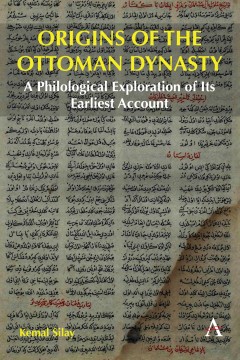Origins of the Ottoman Dynasty
A Philological Exploration of Its Earliest Account
By Kemal Silay
Other Formats Available:
- About This Book
- Reviews
- Author Information
- Series
- Table of Contents
- Links
- Podcasts
About This Book
Ahmedi’s History of the Kings of the Ottoman Lineage and Their Holy Raid(s) against the Infidels is the foundation text for the study of the rise of the Ottoman State. Virtually every scholarly work dealing with the subject refers to his versified account of the early Ottomans. Even though it encompasses only a limited period of the Ottoman dynastic history, its importance derives from the fact that it is the oldest annalistic account of Ottoman history that has come down to us. Because the earliest Ottomans left no accounts of themselves, Ahmedi’s work became the key source—though almost always without a proper reading of the text—for subsequent theories regarding the social and political structure of the early Ottoman State.
The overwhelming religiosity found in Ahmedi’s poem on the Ottomans continues to stir debate among historians. However, his fourteenth-century representation of the ways Ottomans adapted Islam to conform with beliefs of their past reflected a specifically Turkish interpretation of Islam. We can follow that approach in the actions and writings of leaders and poets of succeeding generations of Ottomans all the way to the eighteenth century—that approach was framed by a medieval inheritance whose discursive characteristics continued for centuries. Ahmedi was a discourse-founder and his aim was to represent the Ottoman rulers as pious Muslims.
An understanding of Ahmedi’s representation of the role of Islam among the early Ottomans requires careful contemplation not only by putting the discursive characteristics of his predominantly religious text under a literary and philological microscope but also by making an attempt to place his representation within the much larger context of the making of Turkish Islam in Anatolia. Also, in the writing of histories during the Middle Ages, it was neither unusual nor abnormal to integrate religious concepts as “historical facts.” The medieval author always endeavored to find a creative way of amalgamating the two through the numerous literary devices that were available to him. Theories on the nature and identity of Ahmedi’s text, as well as on the launching of the Ottoman enterprise, surely will continue to evolve in the coming decades—especially when the ongoing Karacahisar excavations in Eskişehir provide us with the archeological record to reconstruct more thoroughly the Ottoman past. Regardless, what we find in the earliest history of the Ottoman State is a pious representation of its founders and a fictional glorification of the jihad as its ideology which continued in subsequent centuries.
Reviews
“Professor Kemal Silay’s Origins of the Ottoman Dynasty is a philological tour de force and the culmination of his twenty-some years of painstaking work. We now finally have an authoritative book providing us with an excellent interpretation and impeccable critical edition and index verborum of the oldest versified Ottoman history. Silay is the leading Ottomanist focusing mostly on philology and literature. He is not a historian by training, but what impressed me the most in this book is that he is indeed following very carefully what Ottoman historians around the globe are publishing. I recommend this fascinating book to anyone who teaches Ottoman history at the college level.”— Professor Mehmet Akif Erdoğru, Ege University
“No study of Ottoman origins can be complete without understanding Ahmedi’s versified history. Ahmedi sings the praises of the Ottomans as champions of gaza and cihad, terms used synonymously to refer to the border raiding that drove Ottoman expansion. Historians need guidance to know how to read this and other early sources created to appeal to audiences of that period. Kemal Silay’s Origins of the Ottoman Dynasty responds to this need by offering the scholarly world a lucid English translation, a comparative edition, and a fastidious transcription of the text, with full critical apparatus. Silay’s edition is a model for the study of early Ottoman texts, and his analysis is essential for understanding the gaza as both narrative and history.” — Carter V. Findley, Humanities Distinguished Professor Emeritus, Department of History, Ohio State University
Author Information
Dr. Kemal Silay is Professor of Ottoman and Modern Turkish Studies in the Hamilton Lugar School of Global and International Studies at Indiana University, Bloomington, USA.
Series
Table of Contents
Acknowledgments; Transcription System; Abbreviations and Symbols; Exegesis; English Translation; Transcription and Critical Apparatus; Critical Index Verborum; Facsimiles; Bibliography
Links
Stay Updated
Information
Latest Tweets



